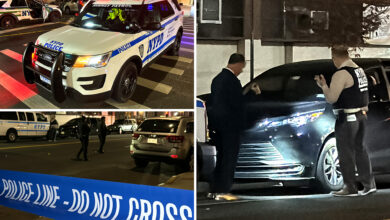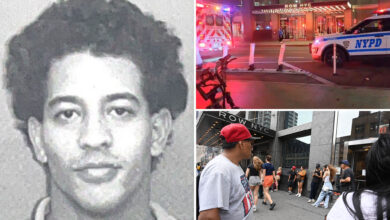‘We need a lot of work’

Just over 2,000 migrants in New York City have been connected with a job under the Adams administration’s ongoing push — as the city has had trouble progressing on a plan to end the continuing crisis by putting immigrants to work.
Only about half of the 9,000 migrants contacted by New York’s much-hyped Workforce1 program since last October even responded to the effort to link them with employers, Small Business Services department official Dynishal Gross told the City Council on Tuesday.
And the majority of the roughly 5,500 migrants reached by agents from the department failed to even get a job, as only 2,000 wound up getting work, Gross testfied.
The figures provide the first glimpse into the slow going for City Hall’s effort to get jobs for asylum seekers, which the mayor and his team have insisted is the only way to lower the number of migrants in city care.
Those figures, though, barely make a dent in the 65,000 migrants under the city’s care — 27,000 of them who are of working age — spurring a call from council members for action.
“I think the fact that we have about 65,000 asylum seekers under our care and only 5,500 have been connected [to SBS services], I think that shows we need a lot of work,” Small Business Chair Feliz Oswald said.
“We are two years into the crisis. By now we should have good systems.”
But the paltry figures don’t show the full picture, argued Lorena Lucero, chief policy adviser in the Mayor’s Office of Immigrant Affairs (MOIA).
During a joint oversight hearing on the matter Tuesday, she blamed the disappointing figures on the city’s inability to accurately track the outcomes of its confusing patchwork of migrant services.
“You really can’t plan for much because things sort of evolve. We’ll continue to support our sister agencies as the needs arrive,” Lucero offered during the oversight hearing.
The city has funded 50 nonprofits to also help provide job services to migrants, according to the MOIA, but the patchwork system of migrant resources makes it hard for the city to know how many migrants have the proper training, work authorization and job search help.
“It’s a little loosey-goosey for me,” Upper West Side Dem Councilwoman Gale Brewer said of the lack of data.
Mayor Eric Adams has repeatedly made the plea for migrants to be able to get jobs.
Just last week, Hizzoner blamed the cumbersome bureaucratic process of getting into the US for pushing some asylum seekers to crime in the wake of the shooting of two NYPD officers, allegedly by a migrant.
“He can’t work. He can’t go to school. So what happens? You have to really think about what I’m going to say, what’s being created in this amazing city,” the mayor said of Bernardo Castro Mata’s immigration case being closed in Chicago months earlier.
For its part, the city has touted its Asylum Application Help Center, which launched last summer and has since expanded to 85 locations, and has helped more than 50,000 people with some sort of application, whether it be asylum or work authorizations.
But the outcome of that program is shrouded too because the federal government does not share application outcomes with the city for privacy reasons.
Help center director Masha Gindler said a rough estimate based on anecdotal evidence is that 5,000 to 10,000 have been completed.
“I think the expertise is here, the question is are we offering the resources and scaling it appropriately,” Alex Aviles said.
Gross said the agency expects foreign-born clients to increase by 5% over the next year, from 20 to 25 percent.
Those migrants could fill labor gaps in New York City’s food service, construction and home health care industries — but only if they can be connected with the jobs, according to city officials.
The officials also called on President Biden to expand a program that grants temporary protected status to asylum seekers from countries facing political turmoil or violence, which would fast-track working authorizations.
last summer. NYC Mayor’s Office of Immigrant Affairs
The White House granted migrants from Venezuela temporary protected status last year, but only if they entered the country before the end of last summer.
New York City, as part of a coalition of 200 US cities, has asked for the White House to designate temporary protected status for migrants fleeing Ecuador, Mali and Mauritania, among other countries.
“By ensuring that individuals with TPS status have access to work opportunities in the formal economy, we can go a long way in promoting their integration into our larger society,” Lucero said.




